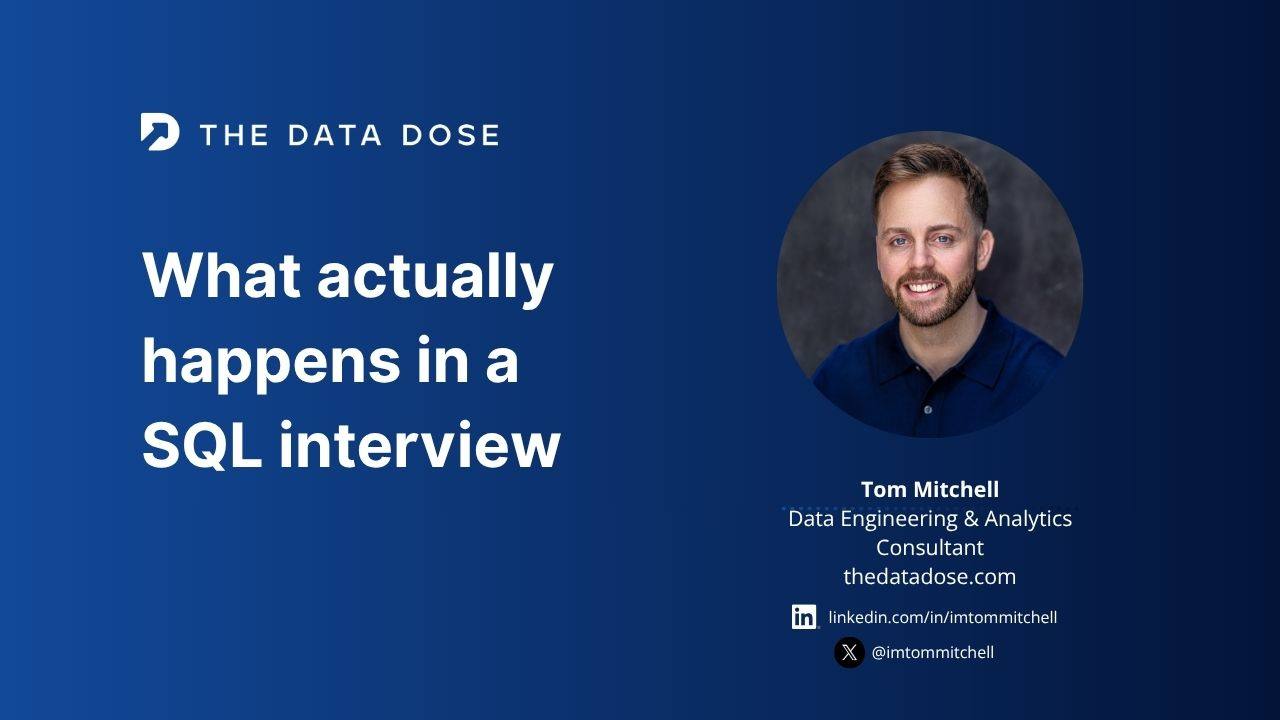The 3 skills that got me promoted from analyst to senior analyst
Hey — Tom here.
Most analysts think getting promoted is about becoming more technical.
They chase advanced certifications, learn exotic tools, and dive deeper into complex statistical methods.
Meanwhile, the person who gets the senior analyst role is usually the one who's mastered three fundamentally different skills.
Skills that have nothing to do with knowing more Python or SQL.
Here's what we're covering this week:
- The 3 core skills that actually drive promotions (hint: they're not what you think)
- Why technical depth alone keeps you stuck at analyst level
- How to demonstrate these skills in your current role
- How to get a promotion without asking
Let's get into it...
The 3 Skills That Actually Matter for Promotion
Skill 1: Translating Business Problems Into Data Questions
Most analysts wait to be told exactly what to analyse.
Senior analysts figure out what the business actually needs to know.
When someone says "sales are down," most analysts jump straight into building charts showing declining revenue.
Senior analysts ask better questions:
- Which segments are driving the decline?
- Is this seasonal or a genuine trend?
- What specific actions could we take based on different answers?
The key difference: Senior analysts think like consultants, not just data processors.
They understand that behind every vague business request is a decision that needs to be made.
Your job isn't just to query data.
It's to structure the analysis around the decision.
How to develop this skill:
Before starting any analysis, ask: "What decision will this analysis inform?"
If you can't answer that clearly, go back and clarify the real business question.
Skill 2: Communicating Insights That Drive Action
Technical accuracy means nothing if nobody acts on your findings.
I've seen brilliant analyses ignored because it was presented as data dumps rather than decision frameworks.
Senior analysts don't just show what the data says.
They explain what it means and what should happen next.
The difference in approach:
Analyst level: "Customer satisfaction scores decreased by 12% this quarter across all regions."
Senior analyst level: "Customer satisfaction is dropping because our response times have increased 40%. I recommend we either hire 2 additional support staff or implement the chatbot solution. Here's the cost-benefit of each option."
Notice the progression: Data → Insight → Recommendation → Options.
How to develop this skill:
End every analysis with a clear recommendation section.
Force yourself to complete this sentence: "Based on this analysis, we should..."
If you can't complete it confidently, your analysis isn't finished.
Skill 3: Understanding the Business Context
This is the skill that separates good analysts from indispensable ones.
Senior analysts understand how their company makes money, what drives costs, and how different departments connect.
When marketing asks for campaign performance analysis, they automatically include cost per acquisition, customer lifetime value, and revenue attribution.
When operations asks for efficiency metrics, they frame everything in terms of cost savings and capacity planning.
The insight: Your analysis is only valuable if it connects to business outcomes.
How to develop this skill:
Learn your company's business model inside out.
Understand your key metrics:
- What drives revenue?
- What are the major cost centres?
- How does each department contribute to the bottom line?
Start every project by asking: "How does this connect to company objectives?"
Why Technical Skills Alone Keep You Stuck
Companies promote people who can be trusted with bigger, more ambiguous problems.
Senior analysts get pulled into strategy meetings.
They're asked for opinions on business decisions.
They're expected to spot opportunities, not just answer questions.
This requires business judgement, not just technical capability.
How to get a promotion without asking
When you're ready to have the promotion conversation, use this structure:
"I've been developing three key areas that I believe are critical for senior analyst work:
Business translation: Give a specific example of how you've turned a vague business request into a structured analysis that drove decisions.
Communication impact: Share an instance where your analysis directly led to action or changed how the team approached a problem.
Strategic thinking: Describe how you've begun to proactively identify analysis opportunities rather than just responding to requests.
Based on this development, I'd like to discuss the path to senior analyst role and what additional responsibilities I could take on."
Notice this conversation is about value delivered, not technical skills mastered.
From there, work with your manager to set targets with deadlines, then you know exactly what is still left for you to do.
TL;DR:
- Master business translation — turn vague requests into structured analysis that drives decisions
- Communicate for action — every analysis should end with clear recommendations and next steps
- Understand the business context — connect your analysis to revenue, costs, and strategic objectives
- Technical skills matter, but business judgement gets you promoted — companies promote people they trust with bigger, more ambiguous problems
Understanding these skills is straightforward. Developing them requires practice with real business scenarios.
Want to see how I actually communicated in real life as a senior analyst?
This week, Premium members (now 20+ and growing!) get access to the Stakeholder Communication Template Library — 12 ready-to-send email templates that make you sound like a senior analyst.
If you're interested, I want to give you one for free as a thank you for reading.
You can access that here 👇🏻
That’s just 1 of 12 templates included in this week’s Premium drop — plus an Analysis Project Tracker, Monthly Impact Tracker, and How to shift your mindset from Junior to Senior Analyst.
You'll also get full access to every past Premium issue, including all worksheets, exercises, and code packs. Everything is ready to practice and apply, not just theory.
Upgrade to Premium below and join 20+ analysts already learning the skills needed to land 6-figure roles 👇🏻




